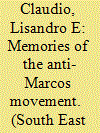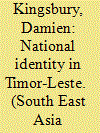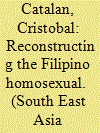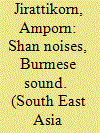|
|
|
Sort Order |
|
|
|
Items / Page
|
|
|
|
|
|
|
| Srl | Item |
| 1 |
ID:
095137


|
|
|
|
|
| Publication |
2010.
|
| Summary/Abstract |
The Bantayog ng mga Bayani [Monument of Heroes] is a memorial centre in Manila dedicated to the memory of individuals who resisted the dictatorship of the late President Ferdinand E. Marcos. This article examines history as represented in this memorial centre. Through an examination of its museum and the debates concerning whom the Bantayog should honour as heroes, it analyses a key historical tension in the representation of the Marcos period: an ambivalence regarding the anti-dictatorship struggle of the organized Left. It also examines the class-based nature of historical memory in the Philippines, arguing that class positions inform who and what is remembered.
|
|
|
|
|
|
|
|
|
|
|
|
|
|
|
|
| 2 |
ID:
095142


|
|
|
|
|
| Publication |
2010.
|
| Summary/Abstract |
Following a long independence struggle and international intervention, in 2006 the tiny impoverished state of Timor-Leste almost imploded in civil chaos and institutional collapse. The events of the time were quickly defined in terms of an east-west geographical and, broadly, linguistic and political divide, corresponding to pro- and anti-government groupings. International intervention quelled the worst of the violence, although elections in 2007 confirmed the general tendency, if not an absolute alignment, to the divide that had appeared in 2006. However, much also united Timor-Leste historically and culturally and, increasingly, in a broad acceptance of civic institutions. It was from this base that the small and sometimes fragile state began to build what promised to be a more coherent future.
|
|
|
|
|
|
|
|
|
|
|
|
|
|
|
|
| 3 |
ID:
095139


|
|
|
|
|
| Publication |
2010.
|
| Summary/Abstract |
Since the 1970s, Filipino cinema has presented internationally distinguished narratives on same-sex sexuality. Contemporary films from the Philippines dealing with issues of sexuality demonstrate an increasing interest in Filipino men who identify themselves as gay. Looking closely at two such films, Ang Lalake sa Parola (Man in the Lighthouse, dir Joselito Altarejo, 2007) and Bathhouse (dir Crisaldo Pablo, 2005), this paper examines how Filipino men engage with (or disengage from) the global gay construct. Drawing on ethnographic research, queer theory and post-colonial discourse, this article analyses how these filmic texts reflect the changing diversities of incumbent homosexual and global gay subjectivities. Using notions of cultural imperialism and protest as a conceptual backdrop, the paper considers the relevance of dichotomies - global/local or metropolitan/rural - in understanding appropriations of the gay identity by characters tied to globalized spaces. Its contention is that these texts illustrate how same-sex screen identities are recontextualized, visually and diegetically, through self-peripheralization of the body and of the self. The author argues that the reshaping and redistribution of homosexual identities is synonymous with a reconstituted (national) resistance to non-Filipino global gay identities.
|
|
|
|
|
|
|
|
|
|
|
|
|
|
|
|
| 4 |
ID:
095141


|
|
|
|
|
| Publication |
2010.
|
| Summary/Abstract |
Although diverse and extensive, scholarship on ethnic riots in South East Asia has given inordinate attention to the genesis, evolution and eventual suppression of such episodes of violence, while many of the available studies have been local in scope and have centred mainly on incidents in modern-day Indonesia and the Philippines. This paper takes as its point of departure some lacunae in the literature on ethnic riots in South East Asia. It seeks to initiate a shift from the study of the causes, processes and conditions that led to the outbreak of ethnic riots to a critical analysis of regional and global responses by both colonial and anticolonial actors in the aftermath. By focusing on the case of the deadly ethnic riots - commonly known as the Maria Hertogh riots - which broke out in Singapore in December 1950, and by drawing connections between local events and wider developments overseas, the paper demonstrates how the study of collective violence in South East Asia and elsewhere can be further enhanced through an analysis of the various strategies that were enacted by colonial states and by the forms of resistance and collaboration of the colonized and other non-state agencies.
|
|
|
|
|
|
|
|
|
|
|
|
|
|
|
|
| 5 |
ID:
095144


|
|
|
|
|
| Publication |
2010.
|
| Summary/Abstract |
This paper examines how ethnic Shan singers use the Burmese language to redefine their own ethnic identity, in the process helping to construct Shans' place in the Burmese national imaginary. The paper focuses on the songs of two Shan artists, Sai Htee Saing and Sai Sai Mao. These two singers have been singing in Burmese for three decades. Both have gained nationwide popularity and are now among the most famous singers in Burma's music industry. The paper consists of two parts. The first one discusses the dynamics of self-representation, examining how Shan artists select and adapt dominant discourses about them to their own task of crafting themselves. The second part investigates the audience reception of these two singers, exploring how particular groups of audience members bring their own ethnicity into interpreting a media text. Through participant observation, interviews with audiences and with the singers themselves, the author seeks to illuminate how such self-fashioning and listening practices reveal complex relations between ethnicity and the popular construction of identity.
|
|
|
|
|
|
|
|
|
|
|
|
|
|
|
|
| 6 |
ID:
095135


|
|
|
|
|
| Publication |
2010.
|
| Summary/Abstract |
This article analyses why some countries in South East Asia have set aside a national day to remember the Japanese Occupation in the cause of nation-building and why other countries have tended to choose not to remember the Japanese Occupation because for them it does not further nation-building. Singapore, the Philippines and Burma have all remembered their experience of struggle and sacrifice during the Second World War to further national unity. However, most South East Asian countries have chosen at a national level not to commemorate this undoubtedly major watershed in the region's history.
|
|
|
|
|
|
|
|
|
|
|
|
|
|
|
|
|
|
|
|
|